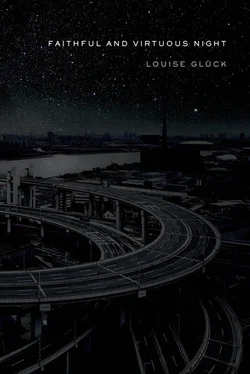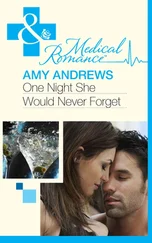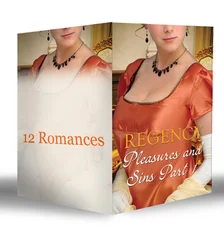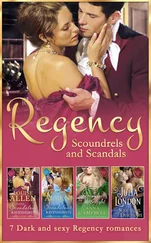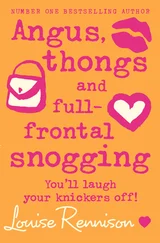But they go back, I said, and I remarked
their sturdiness, as though they had many such returns ahead of them.
You know, he said, our work is difficult: we confront
much sorrow and disappointment.
He gazed at me with increasing frankness.
I was like you once, he added, in love with turbulence.
Now I spoke as to an old friend:
What of you, I said, since he was free to leave,
have you no wish to go home,
to see the city again?
This is my home, he said.
The city — the city is where I disappear.
When the train stops, the woman said, you must get on it. But how will I know, the child asked, it is the right train? It will be the right train, said the woman, because it is the right time. A train approached the station; clouds of grayish smoke streamed from the chimney. How terrified I am, the child thinks, clutching the yellow tulips she will give to her grandmother. Her hair has been tightly braided to withstand the journey. Then, without a word, she gets on the train, from which a strange sound comes, not in a language like the one she speaks, something more like a moan or a cry.
A word drops into the mist
like a child’s ball into high grass
where it remains seductively
flashing and glinting until
the gold bursts are revealed to be
simply field buttercups.
Word/mist, word/mist: thus it was with me.
And yet, my silence was never total—
Like a curtain rising on a vista,
sometimes the mist cleared: alas, the game was over.
The game was over and the word had been
somewhat flattened by the elements
so it was now both recovered and useless.
I was renting, at the time, a house in the country.
Fields and mountains had replaced tall buildings.
Fields, cows, sunsets over the damp meadow.
Night and day distinguished by rotating birdcalls,
the busy murmurs and rustlings merging into
something akin to silence.
I sat, I walked about. When night came,
I went indoors. I cooked modest dinners for myself
by the light of candles.
Evenings, when I could, I wrote in my journal.
Far, far away I heard cowbells
crossing the meadow.
The night grew quiet in its way.
I sensed the vanished words
lying with their companions,
like fragments of an unclaimed biography.
It was all, of course, a great mistake.
I was, I believed, facing the end:
like a fissure in a dirt road,
the end appeared before me—
as though the tree that confronted my parents
had become an abyss shaped like a tree, a black hole
expanding in the dirt, where by day
a simple shadow would have done.
It was, finally, a relief to go home.
When I arrived, the studio was filled with boxes.
Cartons of tubes, boxes of the various
objects that were my still lives,
the vases and mirrors, the blue bowl
I filled with wooden eggs.
As to the journal:
I tried. I persisted.
I moved my chair onto the balcony—
The streetlights were coming on,
lining the sides of the river.
The offices were going dark.
At the river’s edge,
fog encircled the lights;
one could not, after a while, see the lights
but a strange radiance suffused the fog,
its source a mystery.
The night progressed. Fog
swirled over the lit bulbs.
I suppose that is where it was visible;
elsewhere, it was simply the way things were,
blurred where they had been sharp.
I shut my book.
It was all behind me, all in the past.
Ahead, as I have said, was silence.
I spoke to no one.
Sometimes the phone rang.
Day alternated with night, the earth and sky
taking turns being illuminated.
Reading what I have just written, I now believe
I stopped precipitously, so that my story seems to have been
slightly distorted, ending, as it did, not abruptly
but in a kind of artificial mist of the sort
sprayed onto stages to allow for difficult set changes.
Why did I stop? Did some instinct
discern a shape, the artist in me
intervening to stop traffic, as it were?
A shape. Or fate, as the poets say,
intuited in those few long-ago hours—
I must have thought so once.
And yet I dislike the term
which seems to me a crutch, a phase,
the adolescence of the mind, perhaps—
Still, it was a term I used myself,
frequently to explain my failures.
Fate, destiny, whose designs and warnings
now seem to me simply
local symmetries, metonymic
baubles within immense confusion—
Chaos was what I saw.
My brush froze — I could not paint it.
Darkness, silence: that was the feeling.
What did we call it then?
A “crisis of vision” corresponding, I believed,
to the tree that confronted my parents,
but whereas they were forced
forward into the obstacle,
I retreated or fled—
Mist covered the stage (my life).
Characters came and went, costumes were changed,
my brush hand moved side to side
far from the canvas,
side to side, like a windshield wiper.
Surely this was the desert, the dark night.
(In reality, a crowded street in London,
the tourists waving their colored maps.)
One speaks a word: I .
Out of this stream
the great forms—
I took a deep breath. And it came to me
the person who drew that breath
was not the person in my story, his childish hand
confidently wielding the crayon—
Had I been that person? A child but also
an explorer to whom the path is suddenly clear, for whom
the vegetation parts—
And beyond, no longer screened from view, that exalted
solitude Kant perhaps experienced
on his way to the bridges—
(We share a birthday.)
Outside, the festive streets
were strung, in late January, with exhausted Christmas lights.
A woman leaned against her lover’s shoulder
singing Jacques Brel in her thin soprano—
Bravo! the door is shut.
Now nothing escapes, nothing enters—
I hadn’t moved. I felt the desert
stretching ahead, stretching (it now seems)
on all sides, shifting as I speak,
so that I was constantly
face-to-face with blankness, that
stepchild of the sublime,
which, it turns out,
has been both my subject and my medium.
What would my twin have said, had my thoughts
reached him?
Perhaps he would have said
in my case there was no obstacle (for the sake of argument)
after which I would have been
referred to religion, the cemetery where
questions of faith are answered.
The mist had cleared. The empty canvases
were turned inward against the wall.
The little cat is dead (so the song went).
Shall I be raised from death , the spirit asks.
And the sun says yes.
And the desert answers
your voice is sand scattered in wind.
At last the night surrounded me;
I floated on it, perhaps in it,
or it carried me as a river carries
a boat, and at the same time
it swirled above me,
star-studded but dark nevertheless.
These were the moments I lived for.
I was, I felt, mysteriously lifted above the world
so that action was at last impossible
which made thought not only possible but limitless.
It had no end. I did not, I felt,
need to do anything. Everything
would be done for me, or done to me,
and if it was not done, it was not
Читать дальше
